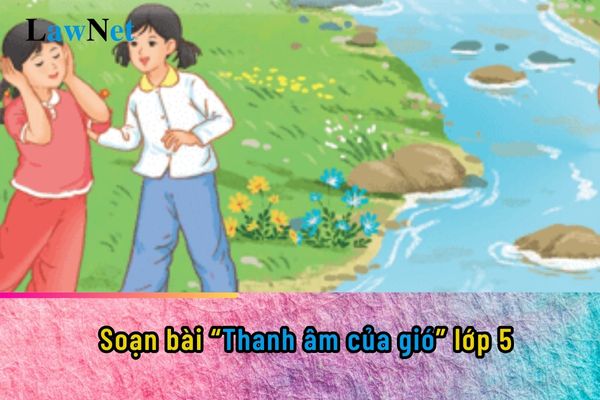Guidelines on preparing the lesson "Thanh âm" for grade 5 students in Vietnam
Guidelines on preparing the lesson "Thanh âm" for grade 5 students in Vietnam
"Thanh âm" is the first lesson for grade 5 students when they return to school.
Below are the guidelines to find content and segment the lesson "Thanh âm" for grade 5 students to make it easier to approach the lesson:
|
*How to divide the sections: Section 1: Introduce the scenery and activities of the characters: herding buffaloes, playing by the stream. |
*Note: The information is for reference purposes only./.
>>> Read more Brief Overview of the lesson on Cells for grade 10 Biology according to the Canh Dieu curriculum in Vietnam
>>> Read more Preparation for grade 10 Math according to the Canh Dieu Textbook Volume 1 in Vietnam
>>> Read more Lesson Plan for the lesson Thanh âm for students in grade 5 in Vietnam
>>> Read more Lesson Plan for Nouns, Verbs, and Adjectives in grade 5 Vietnamese subject in Vietnam

Guidelines on preparing the lesson "Thanh âm" for grade 5 students in Vietnam (Image from the Internet)
What are the characteristics of teaching Literature for grade 5 students in Vietnam?
Based on Section I of the Appendix to the Literature Education Curriculum issued with Circular 32/2018/TT-BGDDT, teaching literature for grade 5 students has the following characteristics:
Literature is a subject in the field of Language and Literature Education, taught from grade 1 to grade 12. At the primary level, this subject is called Vietnamese; in lower and upper secondary school, it is called Literature.
Literature is a subject with the instrumental and aesthetic-humanistic quality; it provides students with communication tools, forms a basis for learning all other subjects and educational activities in school; it is also an important tool to educate students on high cultural, literary, and national language values; developing in students healthy emotions, humane feelings, a humanitarian lifestyle, empathy, etc.
Through linguistic texts and vivid artistic imagery in literary works, by activities of reading, writing, speaking, and listening, Literature plays a significant role in helping students form and develop good qualities and core competencies to live and work effectively, to learn throughout life.
The content of Literature is comprehensive, including cultural knowledge, ethics, philosophy, etc., related to many other subjects and educational activities like History, Geography, Art, Civic Education, Foreign Languages, Natural and Social Sciences, Experiential Activities, Career Orientation, etc. Literature is closely linked to life; it helps students care about and connect more with daily life, relate and have skills to address issues arising in practice.
The core content of the subject includes basic, essential knowledge and skills about Vietnamese and literature, meeting the required qualities and competencies of students at each educational level; it is divided into two phases: the basic education phase and the career-oriented education phase.
Basic education phase: The program is designed according to main segments corresponding to the skills of reading, writing, speaking, and listening. Vietnamese and literary knowledge is integrated into the teaching of reading, writing, speaking, and listening. The materials are selected and arranged to match the student's receptive ability at each educational level.
The goal of this phase is to help students use Vietnamese proficiently for effective communication in life and to learn well in other subjects and educational activities; to form and develop literary competence, an expression of aesthetic capacity; simultaneously nurture thoughts and feelings so students grow in soul and character.
Career-oriented education phase: The program consolidates and develops the results of the basic education phase, helping students enhance their language and literary competence, especially in literary text reception; it intensifies skills of composing argumentative texts and informational texts with more complex content and writing techniques; it equips students with some knowledge of literary history, literary theory, which is practical for reading and writing about literature; it continues to nurture thoughts, emotions, soul, and character so that students become responsible citizens.
Moreover, each year, students oriented towards social sciences and humanities choose to study specific learning modules.
These modules aim to deepen knowledge of literature and language, apply knowledge to practice, satisfying students' interests, needs, and career orientation.
How to build the Literature Curriculum for grade 5 in Vietnam?
Based on Section II of the Appendix to the Literature Education Curriculum issued with Circular 32/2018/TT-BGDDT, building the literature curriculum for grade 5 is as follows:
The Literature Curriculum complies with the basic regulations stated in the Overall Curriculum, emphasizing several perspectives:
-
The program is built on theoretical and practical foundations, updating research achievements in education, psychology, and teaching methods of Literature; research achievements in literature and linguistics; the achievements of Vietnamese literature through periods; experiences in building the literature curriculum of Vietnam, especially since the beginning of the 21st century to the present and the international trends in curriculum development in general, the literature curriculum in particular, especially of developed countries; social reality, education, economic conditions, and Vietnamese cultural traditions, especially the diversity of students in terms of regions, learning conditions, and abilities.
-
The program takes the training of communication skills (reading, writing, speaking, and listening) as the main thread throughout all three educational levels to meet the needs of the competency-oriented program while ensuring coherence and continuity in all grades.
The basic, foundational general education knowledge about Vietnamese and literature is formed through teaching activities of receiving and creating texts; directly serving the need to train reading, writing, speaking, and listening skills.
-
The program is built open-ended, shown by not specifying detailed teaching content but only required achievements in reading, writing, speaking, and listening for each grade; it specifies some basic, core knowledge about Vietnamese, literature, and some important Vietnamese literature texts as the mandatory content for students nationwide.
-
The program both meets the renewal demand and focuses on inheriting and promoting the advantages of the existing literature curricula, especially the current curriculum.
DOWNLOAD the Literature Education Curriculum issued with Circular 32/2018/TT-BGDDT.

